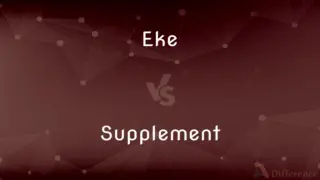Buyer vs. Merchant — What's the Difference?
Edited by Tayyaba Rehman — By Maham Liaqat — Updated on May 9, 2024
A buyer is a person or entity purchasing goods or services for personal use or resale, while a merchant is an individual or business selling goods or services directly to customers, often as a retailer or wholesaler.

Difference Between Buyer and Merchant
Table of Contents
ADVERTISEMENT
Key Differences
A buyer acquires products, either for personal use or to resell in a business, often seeking the best price and quality. Conversely, a merchant sells these goods, aiming to attract buyers by offering competitive pricing, quality, and customer service.
Buyers frequently conduct market research to identify their desired products and compare options, whereas merchants analyze market demand to determine the products they should stock and sell.
Buyers focus on meeting their own or their customers' needs, ensuring that the products purchased align with these requirements. Merchants, on the other hand, consider how to promote and display their inventory to appeal to buyers effectively.
Buyers often compare prices and features across various merchants to find the best deal. Conversely, merchants may offer discounts, promotions, or loyalty programs to entice buyers.
Buyers are often individuals or procurement professionals working for companies. Merchants can be small business owners or large companies selling directly to the end consumer or other businesses.
ADVERTISEMENT
Comparison Chart
Definition
Person or entity purchasing goods
Person or business selling goods
Purpose
Acquire goods for use or resale
Sell goods to meet buyer demand
Focus
Finding the best price and quality
Offering attractive products and prices
Strategy
Market research, comparison shopping
Promotions, market analysis, customer service
Type
Individuals, procurement professionals
Retailers, wholesalers
Compare with Definitions
Buyer
Procurement specialist handling vendor relationships.
The buyer negotiated favorable terms with new suppliers.
Merchant
Shopkeeper managing a store.
The local merchant was known for friendly service and quality goods.
Buyer
Individual or organization purchasing products.
The company hired a buyer to handle its supply chain purchases.
Merchant
Business or individual selling goods or services.
The online merchant offered a wide range of electronics.
Buyer
Consumer acquiring goods for personal use.
The buyer compared different laptops before making a decision.
Merchant
Retailer or wholesaler dealing directly with buyers.
The merchant provided discounts for bulk orders.
Buyer
Person seeking to buy a particular asset.
The house buyer carefully inspected the property before closing the deal.
Merchant
Person specializing in commerce or trade.
As a textile merchant, she sourced fabrics from international suppliers.
Buyer
Entity acquiring goods to resell.
The boutique's buyer visited the trade show to find new inventory.
Merchant
Vendor operating in specific markets.
A fruit merchant supplied fresh produce to the city's best restaurants.
Buyer
One that buys, especially a purchasing agent for a retail store.
Merchant
A merchant is a person who trades in commodities produced by other people, especially one who trades with foreign countries. Historically, a merchant is anyone who is involved in business or trade.
Buyer
A person who makes one or more purchases.
Every person who steps through the door is a potential buyer, so acknowledge their presence.
Merchant
A person or company involved in wholesale trade, especially one dealing with foreign countries or supplying goods to a particular trade
A builders' merchant
A tea merchant
Buyer
(retailing) A person who purchases items for resale in a retail establishment.
The supermarket's new buyer decided to stock a larger range of vegetarian foods.
Merchant
A person who has a liking for a particular activity
His driver was no speed merchant
Buyer
(manufacturing) A person who purchases items consumed or used as components in the manufacture of products.
Merchant
(in historical contexts) relating to merchants or commerce
The growth of the merchant classes
Buyer
One who buys; a purchaser.
Merchant
One whose occupation is the wholesale purchase and retail sale of goods for profit.
Buyer
A person who buys
Merchant
One who runs a retail business; a shopkeeper.
Merchant
Of or relating to merchants, merchandise, or commercial trade
A merchant guild.
Merchant
Of or relating to the merchant marine
Merchant ships.
Merchant
A person who traffics in commodities for profit.
Merchant
The owner or operator of a retail business.
Merchant
A trading vessel; a merchantman.
Merchant
Someone who is noted for a stated type of activity or behaviour.
He's some kind of speed merchant — he drives way too fast.
Goal merchant Smith scored twice again in the match against Mudchester Rovers.
Merchant
(obsolete) A supercargo.
Merchant
As a resident of a region, to buy goods from a non-resident and sell them to another non-resident.
A merchanting service
Merchant
One who traffics on a large scale, especially with foreign countries; a trafficker; a trader.
Others, like merchants, venture trade abroad.
Merchant
A trading vessel; a merchantman.
Merchant
One who keeps a store or shop for the sale of goods; a shopkeeper.
Merchant
Of, pertaining to, or employed in, trade or merchandise; as, the merchant service.
Merchant
To be a merchant; to trade.
Merchant
A businessperson engaged in retail trade
Common Curiosities
Do merchants work with buyers directly?
Yes, merchants often interact with buyers directly, especially in retail and wholesale settings.
What skills are crucial for a buyer?
A buyer should have strong negotiation, research, and relationship-building skills.
Do buyers work in specialized fields?
Yes, buyers often specialize in specific industries, such as fashion, electronics, or groceries.
What strategies do buyers use to find products?
Buyers often conduct market research, compare prices, and evaluate product quality before purchasing.
Can a merchant also act as a buyer?
Yes, merchants often buy goods from manufacturers or suppliers to resell to their customers.
What is a merchant's primary objective?
A merchant's main goal is to sell goods or services profitably to meet buyer demand.
What responsibilities do merchants have to their customers?
Merchants must provide quality products, fair pricing, and good customer support.
Do buyers require training?
While formal training isn't always required, many buyers benefit from courses in procurement, business, or sales.
How do merchants differ from retailers?
Merchants can be both retailers and wholesalers, selling directly to consumers or other businesses.
What is the primary role of a buyer?
A buyer is responsible for finding and purchasing goods or services for personal use, business use, or resale.
Are all buyers individuals?
No, some buyers are procurement professionals working for companies or organizations.
Are buyers and merchants equally important in commerce?
Yes, both play crucial roles in the supply chain, ensuring goods move efficiently from production to the end consumer.
What types of merchants exist in commerce?
Merchants include retailers, wholesalers, market vendors, and online sellers.
How do merchants attract buyers?
Merchants use marketing, competitive pricing, promotions, and excellent customer service to attract buyers.
Can a buyer also become a merchant?
Yes, a buyer can transition into a merchant role by acquiring goods for resale in a business.
Share Your Discovery

Previous Comparison
Eke vs. Supplement
Next Comparison
Diamond vs. SolitaireAuthor Spotlight
Written by
Maham LiaqatEdited by
Tayyaba RehmanTayyaba Rehman is a distinguished writer, currently serving as a primary contributor to askdifference.com. As a researcher in semantics and etymology, Tayyaba's passion for the complexity of languages and their distinctions has found a perfect home on the platform. Tayyaba delves into the intricacies of language, distinguishing between commonly confused words and phrases, thereby providing clarity for readers worldwide.












































